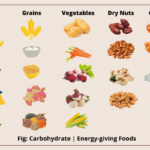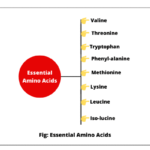What is Nutrition | Types of Nutrients
The intake of various nutrients present in food for the development, actions, protection of the body from diseases, and for the fulfillment of physical needs is known as nutrition. It plays a very important role in our lifestyle.
If someone is taking good nutrition, it indicates that he or she is taking the appropriate amount of nutritious food at the appropriate time. Many diseases occur in our body due to wrong eating.
Whenever we take food or liquids, our body digests food and absorbs essential nutrients like carbohydrates, proteins, fats, vitamins, minerals, and water from the food.
These nutrients then are converted into blood and energy from which makes our body healthy and strong.
Table of Contents
Nutrients Definition
Nutrients are the substance within the food that provides nourishment essential for growth and the maintenance of life. They are absorbed by the body to produce energy, tissues, and perform various functions.
For example, fish is a source of many important nutrients such as protein, vitamins, and minerals. We get essential nutrients from food. We can not eat individual nutrients because we eat food, not nutrients.
In order to lead a healthy life, we should always eat the right amount of food filled with various nutrients so that we can sustain healthy life. If we intake a poor combination of foods, we may deprive of some essential nutrients.
Therefore, choosing a diet that could provide all the essential nutrients for our body can be challenging.
Nutrients in Food
There are over 40 nutrients that are essential to sustain healthy and happy life. We need to intake all these essential nutrients from our diets because they cannot be made by our bodies in enough amounts to optimize our health.
Different foods contain different types of nutrients in variable amounts. For example, fish, chicken, and beef provide vitamin B6, protein, and iron. Bread and rice provide protein and carbohydrates.
On intake of fruits and vegetables, we get carbohydrates, fiber, vitamin A and vitamin C. Vegetable oils give us fat and vitamin E. Therefore, we need to choose the right combination of foods to live a healthy and beautiful life.
Basic Functions of Nutrients
Nutrients provide three basic functions in the human body that are as follows:
1. Energy:
Some nutrients provide energy or fuel to our body to stay alive, move, and grow. This energy helps for our heart pumping, lung inhaling, body warm, stomach churning, and our muscles working.
Carbohydrates, proteins, and lipids are only the nutrients that provide energy to our body. Therefore, these three nutrients are also known as energy-yielding nutrients. The energy that is absorbed by body, is measured in calories or kilocalories (abbreviated as kcalories or kcals) or in kilojoules.
One gram of carbohydrate provides 4 calories energy to our body. Similarly, one gram of protein also provides 4 calories of energy. A gram of fat provides 9 calories that are twice calories of carbohydrate or protein.
One gram of alcohol also provides 7 calories energy, but it is not considered as a nutrient because it is not needed by the body. If we intake more calories than we use, our body will store extra energy that is not good for the body because our body may be fat. Intaking calories as our needs, our body weight will remain the same and you will feel fit and healthy. If we consume fewer calories as per our needs, our body will lose weight.
2. Structure:
Another important function of nutrients is to help form body structure. For example, minerals like calcium and phosphorus help to make bones and teeth hard. Protein helps for the formation of structure of our body muscles. Water is a structural nutrient because 70 to 90 percent of living cells are made up of water.
3. Regulation:
Nutrients also act as regulators for functions of the body. All the processes (such as breakdown of carbohydrates and fats to provide energy, building of bone and muscles to form body structure) that occur in our bodies must be regulated for the body to function properly.
For example, carbohydrates help to maintain the level of proteins in the blood. Water helps to regulate the temperature of the body. Vitamins and minerals help to regulate the chemical reactions within the body.
How do Cells get Nutrients?
Foods that we eat must be digested and nutrients must be absorbed by the body to provide the nourishment it. The process in which food breaks down into small molecules is called digestion and the system which is responsible for digestion is called digestive system.
When food breaks down into small molecules, it is absorbed by the body. This process is called absorption. The food that we eat passes down into the stomach through the esophagus tube and then on to the small intestine.
Substances such as mucus and enzymes are secreted into the stomach for digestion of food. Most of the digestion of food and absorption of essential nutrients occurs in the small intestine. The nutrients that are absorbed, are transported in the blood to cells. Anything that is not absorbed moves into the large intestine.
Types of Nutrients
There are seven different types of nutrients that are very essential for our body. The seven nutrients are as follows:
- Carbohydrates
- Proteins
- Fats
- Vitamins
- Minerals
- Water
- Roughage

➲ Carbohydrates, proteins, and fats are the most important nutrients for our body and they are known as macronutrients. Macronutrients are needed in the diet in relatively large amounts.
Carbohydrates and fats are called energy-giving foods. They provide energy to our body. Carbohydrates contribute about 45% of calories in most diets. Sugars are the simplest form of carbohydrates that are found in milk, fruit, honey, and table sugar.
➲ Vitamins and minerals are known as micronutrients that act as protecting principles of food. Micronutrients are required only in small amounts. They do not provide energy.
➲ Protein is known as body-builder. It is the most essential for body development, tissue repair, repair of body structure, and synthesis of regulatory molecules. It can also be broken down to produce energy.
➲ Water is the most essential nutrients because 70 to 90 percent of living cells are made up of water. Two-thirds of human bodies are made up of water. It does not provide energy but is required in the body to transport nutrients, oxygen, waste products, and other important substances. It is also needed to regulate body temperature.
➲ The human diet should contain mineral elements such as calcium, calcium, chlorine, magnesium, phosphorus, potassium, sodium, sulfur, and trace minerals.
The most important trace minerals are Chromium, Cobalt, Copper, Copper, Fluorine, Iodine, Iron, Manganese, Molybdenum, Selenium, and Zinc are very important for our body.
➲ Calcium and phosphorus accumulate in bones and teeth to give them strength and stiffness. Calcium (Ca ++) also helps in blood coagulation, neuromuscular action, cardiac functions, and actions of many enzymes and hormones. Calcium is required for normal muscle and nerve functions.
➲ Phosphorus helps in maintaining the continuous composition of body fluids.
➲ Magnesium as a catalyst is required for many intracellular enzymatic reactions. Potassium and magnesium are required for proper muscular contraction.
‘➲ Iron is required for hemoglobin and cytochrome synthesis. This gives RBC a red color. It is required to transport oxygen to operate the oxidation system within tissues and tissue cells.
➲ Fluorine maintains normal dental enamel and prevents dental cavities.
➲ Zinc helps in healthy and proper functioning of the tongue. It helps to transport Co2. It is also important for the digestion of proteins in the accessory canal.
➲ Copper helps in the use of iron. Copper deficiency can cause anemia.
➲ Sulfur is a component of the hormone such as insulin. It is essential for normal metabolism.
➲ Iodine is required for the production of thyroid hormone which is secreted by the thyroid gland. Lack of iodine causes goiter like a disease.
Types of Nutrition
There are mainly two types of nutrition. They are as follows:
- Good Nutrition
- Malnutrition
1. Good Nutrition: Taking proper and certain amounts of nutrients as per the requirement of the body is called good nutrition or proper nutrition. It helps us to develop the full health of our body and at the same time keeps it healthy.
Persons taking nutrition are always extremely healthy physically, mentally, socially, and emotionally.
2. Malnutrition: Mal means bad and malnutrition means: Improper nutrition (means bad nutrition). When there is deficiency or excess of one or more nutrients in the body, it is called malnutrition.
When a person does not get the nutritional content suited to his physical needs, the person becomes malnourished and becomes physically, mentally, socially, and emotionally unwell.
Types of Malnutrition
There are mainly two types of malnutrition, which are as follows:
- Undernutrition: The nutrient which is lacking in one or more elements is called undernutrition. This nutrition is not sufficient for the body and health of the person falls. In such a situation the physical and mental development stops and the person becomes weak.
- Overnutrition: Nutrition in which the amount of nutrients is more than normal is harmful to the body and it is called excessive or over nutrition. Obesity is increased due to having more calories in the diet and toxicity is produced in the body. Both conditions are harmful to the body.
Why is nutrition necessary for our body in life?
Eating a well-balanced diet is important for growing our body and good health. Food and water are essential to growing our body and keeping healthy. A well-balanced diet contains some necessary nutrients, like carbohydrates, proteins, fats, vitamins, minerals, and water.
These all nutrients have various roles for body growth, correct functioning, the expansion and replacement of cells. Therefore, we’d like a good style of completely different foods to provide the proper quantity of nutrients for the healthy body.
Relationship between Food, Nutrition, and Health
Eating good nutrition always keeps the health of person good. The lifespan of life increases and the person remains healthy. The person lives an active life and is also mentally healthy.
Based on research, it has been found that the weight of a person with malnutrition has been found to be less than normal. It also has low immunity. Weak body, weak bones, diseased body, dry hair, skin, etc. are caused due to eating malnutrition.
Therefore, we should always eat nutritional food so that physical development, physical mental capacity, work capacity, disease prevention ability, older and more active lives in the body.
Nutrition Quiz: 30 MCQs for Competitive Exams
Conclusion
Nutrition is the study of all the intercommunications that occur between people and food. We eat food, not individual nutrients. If we choose the right combination of foods, our diet will provide all the nutrients to stay healthy life.
If we take a poor combination of foods, we may deprive of some essential nutrients. Taking a good diet that provides all essential nutrients, can be challenging for us.








